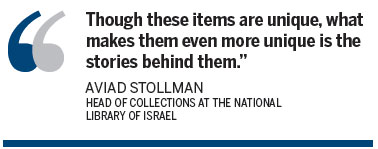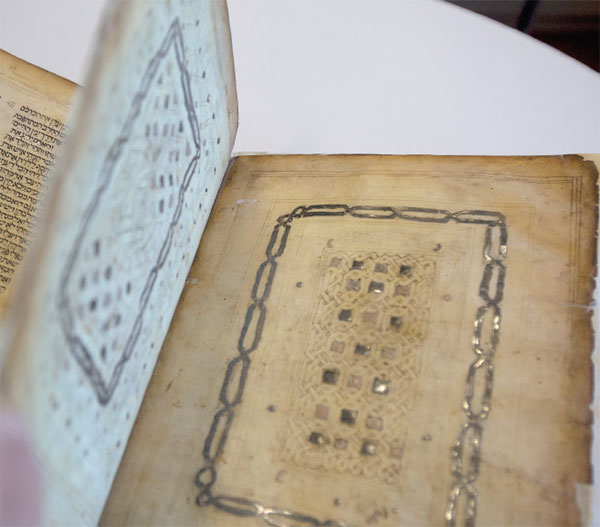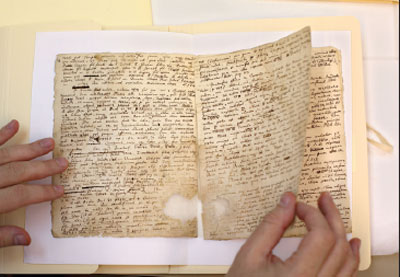Israeli library's manuscript collection tells unique tales
Country opening vault of treasures to publicize effort to digitize historic Hebrew works
These are treasures that Israel doesn't allow anyone to check out of its national library.
Kafka's Hebrew vocabulary notebook. The first written evidence of the Yiddish language. And the Crowns of Damascus, Bibles smuggled out of Syria 20 years ago in a Mossad spy operation so classified that their very existence in Israel was kept secret for years.
Many nations maintain official libraries of their countries' most prized historical manuscripts. Israel's is unique: It seeks manuscripts from every country in the world where Jews have ever lived.
Now the National Library of Israel is dusting the cobwebs off some of the most prized jewels of its collection as it seeks to draw attention to a new effort to preserve - and publicize - these treasures.
It's pioneering a worldwide initiative to digitize every Hebrew manuscript in existence. It's building a new home next to the Israeli Parliament.
On Sunday, it sent a prized manuscript handwritten by medieval Jewish philosopher Maimonides to France accompanied by guards for a first-ever display at the Louvre Museum.

'Crowns' of Damascus
"Though these items are unique, what makes them even more unique is the stories behind them," said Aviad Stollman, the library's head of collections.
These "crowns", a Jewish term for revered biblical manuscripts, are some of the earliest complete manuscripts of the Hebrew Bible. Written in the Middle East and Europe between 700 and 1,000 years ago, they were safeguarded by Syria's ancient Jewish community in Damascus for hundreds of years.
Syria's late dictator, Hafez Assad, lifted travel restrictions on Jews in the early 1990s. Some resettled in Israel, and with them, the manuscripts, in a classified operation by Israel's Mossad espionage agency. They were deposited at the national library for restoration and climate-controlled storage.
"We got them from the Mossad on condition that we would keep it a complete secret," said Raphi Weiser, who at the time was the director of the library's manuscripts and archives director. Only a dozen staffers at the library knew about the manuscripts at the time, said Weiser, who is retired and still volunteers at the library.
The existence of the manuscripts in Israel was made public in 2000, when they were shown to a private audience. They have not been displayed since.
The most precious of the collection, a 13th-century Spanish Bible, used to be kept at Damascus' ancient Jobar synagogue, Weiser said. Last year the synagogue was destroyed in Syria's civil war, according to opposition activists.
Kafka's notebook
This thin notebook contains 20 pages of Hebrew vocabulary words scrawled in the large block letters of pre-eminent author Franz Kafka.
At the end of his life, the German-speaking Jewish author considered leaving Prague and moving to pre-state Israel.
He took Hebrew lessons with an 18-year-old Jerusalem native who was in Prague in the 1920s studying math. He never moved to the emerging Jewish state, which gained independence in 1948, but his teacher eventually donated her student's vocabulary notebook to the collection.
None of Kafka's writings were supposed to have survived. Before he died, Kafka asked his friend to burn them. Instead, his works were published, turning Kafka posthumously into one of the most celebrated writers of the 20th century.
In a Kafkaesque courtroom saga, an Israeli court in 2012 ruled that two Israeli sisters in possession of a trove of unpublished Kafka manuscripts must hand them over to the national library.
The ruling is being appealed. The library says if it receives the manuscripts, it will post them online, and unknown stories by Kafka may emerge.
|
Israel's National Library gave the media a rare peek at a Jewish manuscript smuggled into Israel from Damascus in a Mossad spy operation in the early 1990s in Jerusalem. The manuscript is one of the earliest existing complete manuscripts of the Hebrew Bible and is one of many rare historical manuscripts in the library's collection. Sebastian Scheine / Associated Press |
|
Sir Isaac Newton's book of theological writings is one of the many historical manuscripts at Israel's National Library. Sebastian Scheine / Associated Press |
(China Daily 10/09/2014 page10)
















